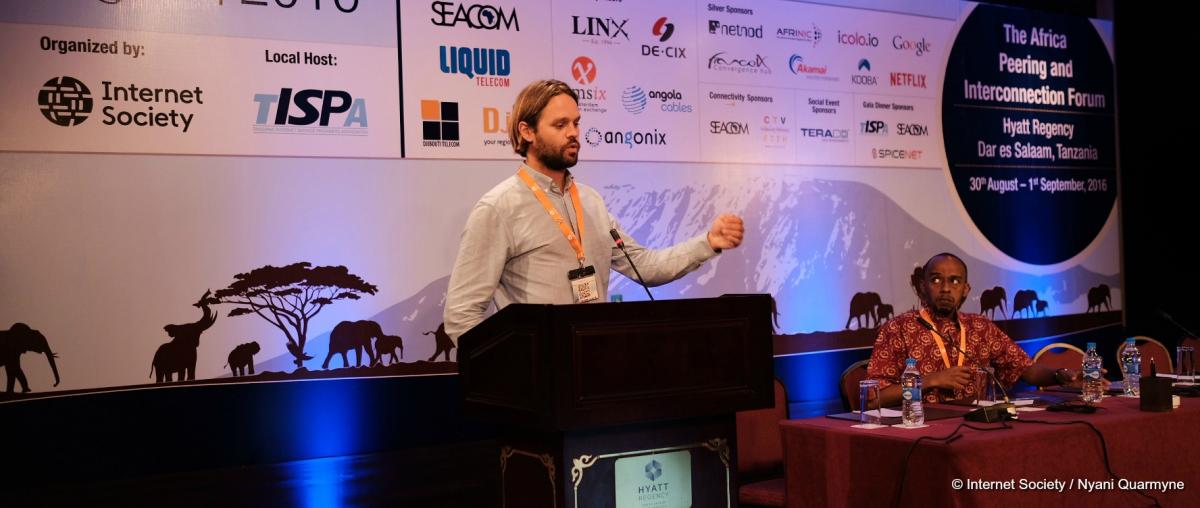Day Two Summary: Back To Basics
 The two day forum attracts Chief Technology Officers, Chief Information Officers, peering coordinators and business development managers Internet service providers and operators, telecommunications policy-makers and regulators, content providers, Internet exchange point (IXP) operators, infrastructure providers, data center managers, National Research and Education Networks (NRENs), carriers and transit providers, among other participants.
The two day forum attracts Chief Technology Officers, Chief Information Officers, peering coordinators and business development managers Internet service providers and operators, telecommunications policy-makers and regulators, content providers, Internet exchange point (IXP) operators, infrastructure providers, data center managers, National Research and Education Networks (NRENs), carriers and transit providers, among other participants.
The opening ceremony attracted speakers from government and private sector and the keynote speech was delivered by Eng. Dr. Maria L. Sasabo – Deputy Permanent Secretary (Communication), Ministry of Works, Transport and Communication– G.O.H – representing the Minister. Dr. Raymond Mfungahema, Director, Consumer and Industry Affairs represented the Ag. DG – Tanzania Communications Regulatory Authority (key note speaker). Mr. Benjamin Dotto- Represented the C.E.O – e-Government Agency and Dr. Kamugisha Kazaura – C.E.O – Tanzania Telecommunications Company Ltd. (TTCL)
In his opening speech, Dawit Bekele, Director of the Internet Society Africa Regional Bureau, underscored the importance of engaging various players in the internet ecosystem, to ensure increased connectivity and continued reduction of cross border barriers and connectivity costs.
In line with the theme “Back to Basics”, Bekele took the participants through the vision of the Internet Society, since its establishment 24 years ago. Over the years, the Internet Society has endeavored to bring the Internet to everyone, and its mission includes:
- Facilitation of open development of standards and protocols
- Supporting education in developing countries
- Promoting professional development and building community to foster participation and leadership in areas important to the evolution of the Internet.
- Providing reliable information about the Internet.
- Providing forums for discussion of issues that affect Internet evolution, development and use in technical, commercial, societal, and other contexts.
- Fostering an environment for international cooperation, community, and a culture that enables self-governance to work.
- Serving as a focal point for cooperative efforts to promote the Internet as a positive tool to benefit all people throughout the world and
- Providing management and coordination for on-strategy initiatives and outreach efforts in humanitarian, educational, societal, and other contexts.
In his speech, Bekele noted that in 2008, there were only 17 IXPs all over Africa amongst which only 12 were operational. As a result there was very little peering happening in Africa. After the first AfPIF in 2010, and other projects such as AXIS, the number of IXPs has increased to 33 today. In 2016, half of African countries have working IXPs and most importantly, the ratio of the peering and transit is increasing.
Throughout the years, AFPIF has discussed important issues for the community to help understand the challenges it is facing in developing interconnection and traffic exchange in Africa but also in identifying the solutions.
After six AFPIF meetings, Bekele said, the program committee decided that it is important to remind ourselves what are the fundamental issues we need to consider when building Africa’s interconnection, hence the theme; “Back to Basics”. Bekele was optimistic that there would be fruitful discussions. He thanked the sponsors, who made the meeting possible.
In her opening remarks, Eng. Dr. Maria L. Sasabo highlighted the significant strides that Tanzania had made in ensuring infrastructure development and facilitating the private sector’s ability to compete on the global stage for investments.
To promote the favorable business environment, Tanzania reviewed its ICT policy this year and strengthened provisions for ICT leadership, access and infrastructure development, spectrum numbering and management, e-services, local content, IPv6 deployment and cyber security among others.
Tanzania has 45,000km fiber backbone connecting to neighboring countries; Uganda, Kenya, Rwanda, Burundi, Democratic Republic of Congo, Zambia, Malawi and Mozambique. There are six IXPs; Dar es Salaam, Mbeya, Mtwara, Zanzibar, Dodoma, and Arusha.
The government has put in place the Universal Service Fund that pushes for the establishment of infrastructure in economically unattractive areas, allowing operators to connect and serve more people. Currently, 79% of the population is covered through voice and 17 million people have access to the Internet.
Promoting Content in Africa
The keynote speech by Bastiaan Quast was based on a research on promoting content in Africa. The research, commissioned by the Internet Society, found that local languages were key to the development and increase of local content and hosting in a country. Studies in Asia found that the increased use of local languages online had led to increased content, accessed locally.
Monetization of the content is important to the ecosystem, though it remains a challenge for many websites in languages other than English, French, Spanish and Portuguese. Even with the app stores, payment of local language content remains a challenge , which makes crowd funding and seed funding hard; people cannot invest without a proper business model.
Want to help promote local content in Africa? Here’s 5 things you can do.
Policy and regulation
The last panel of the day was on policy and regulation, where government and private sector participants sat together and discussed ways to conquer cross border connectivity.
Participants agreed that major strides had been made, especially in Eastern and Southern Africa, with regional bodies exploring ways to work together more. The legal framework for data protection and privacy was cited as one of the major stumbling blocks to global cloud providers entering the African market.